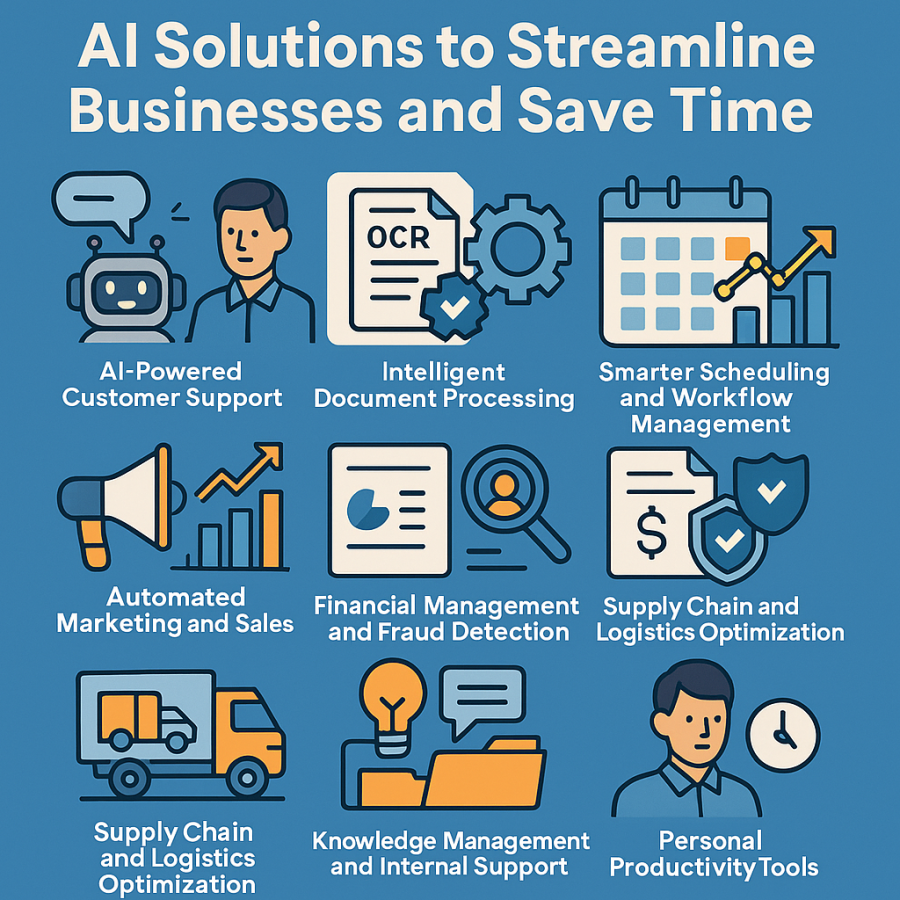AI Solutions to Streamline Businesses and Save Time
In today’s fast-paced environment, time is one of the most valuable resources a business can possess. Whether you are running a small local enterprise or a large corporation, inefficiencies can easily consume hours of staff time, slow down customer response, and limit growth opportunities. Artificial Intelligence (AI) offers a transformative path forward—allowing businesses to automate repetitive tasks, reduce errors, and uncover insights that lead to faster and smarter decision-making. Below are some of the most practical AI solutions available today that can help streamline operations and reclaim valuable time.
1. AI-Powered Customer Support
One of the most common sources of inefficiency in business is the handling of customer enquiries. Traditional customer service models often require teams of staff to respond to repetitive questions about pricing, availability, shipping, or account issues.
AI-driven chatbots and virtual assistants can manage these interactions 24/7. Modern solutions are conversational, capable of understanding context, and often indistinguishable from human support for straightforward questions. By automatically answering FAQs, routing complex queries to the right department, and providing instant resolutions, these systems reduce wait times for customers and free staff to focus on more strategic tasks.
For example, a software company might implement an AI support bot that answers product workflow questions, tracks common pain points, and provides feedback to the development team—resulting in faster improvements and happier users.
2. Intelligent Document Processing
Businesses are inundated with documents: invoices, contracts, forms, reports, and more. Processing these manually is time-consuming and error-prone. AI-driven Optical Character Recognition (OCR) and Natural Language Processing (NLP) tools can read, classify, and extract key data from documents in seconds.
This enables finance teams to automatically reconcile invoices, HR departments to process job applications efficiently, and legal teams to analyse contracts without combing through every page. With the repetitive legwork automated, employees can redirect energy towards interpretation, negotiation, and strategy.
3. Smarter Scheduling and Workflow Management
Meetings, rosters, and project deadlines are often plagued by inefficiencies. AI-based scheduling tools can analyse calendars, preferences, and availability across teams to automatically suggest the best meeting times—removing the endless back-and-forth emails.
Similarly, AI-powered workflow management software can predict project bottlenecks, reallocate resources, and notify managers when deadlines are at risk. These systems do not just save time; they also improve team productivity by proactively identifying issues before they escalate.
4. Predictive Analytics for Decision-Making
Business leaders often rely on instinct and historical data to make decisions. AI can take this further by predicting outcomes using advanced algorithms.
Retailers, for example, can leverage AI to forecast demand, ensuring stock levels meet customer needs without overspending on inventory. Logistics companies can predict delivery times, anticipate disruptions, and optimise routes. Even small businesses can benefit by analysing customer purchase behaviour to refine marketing campaigns.
The power of predictive analytics lies in its ability to save time otherwise wasted on trial-and-error strategies, while also providing confidence in decision-making.
5. Automated Marketing and Sales
AI has rapidly transformed how businesses approach marketing and sales. Tools powered by machine learning can segment audiences, personalise campaigns, and optimise ad spend in real time.
Instead of manually adjusting campaigns, AI systems can identify which messages resonate, what time of day performs best, and which channels drive the most conversions. In sales, AI-powered CRM platforms provide lead-scoring models that automatically prioritise the most promising opportunities, saving teams from chasing unqualified leads.
For businesses, this means reduced marketing waste and more time spent on high-value opportunities.
6. Streamlined Recruitment and HR Management
Hiring the right people is essential but often time-intensive. AI recruitment platforms can scan thousands of applications, identify the most qualified candidates, and even conduct initial video interviews with automated scoring.
AI can also support HR through employee sentiment analysis, performance tracking, and predictive modelling to identify potential retention risks. By automating these tasks, HR professionals gain more time to focus on culture, leadership, and employee engagement.
7. Financial Management and Fraud Detection
Financial processes are prone to both inefficiency and risk. AI-driven accounting platforms can categorise expenses, generate reports, and flag anomalies automatically. Some solutions integrate directly with banking systems to provide real-time cashflow insights.
AI also plays a critical role in fraud detection, scanning thousands of transactions per second to identify suspicious activity. By reducing manual reviews and spotting risks early, businesses save time and avoid costly mistakes.
8. Supply Chain and Logistics Optimisation
For product-based businesses, supply chain management is one of the most complex areas. AI can help forecast demand, optimise shipping routes, and even predict when equipment is likely to fail, allowing proactive maintenance.
These optimisations reduce downtime, ensure products reach customers faster, and cut down on wasted resources. With AI, logistics teams can focus less on micromanaging and more on long-term strategy.
9. Knowledge Management and Internal Support
Employees spend significant time searching for information across shared drives, emails, and messaging platforms. AI-powered knowledge bases can provide instant answers to internal queries, whether about company policies, IT troubleshooting, or workflow processes.
By surfacing the right information at the right time, these systems reduce delays and ensure staff can continue working without constant interruptions.
10. Personal Productivity Tools
Finally, AI is not limited to enterprise-scale solutions. Individual employees can benefit from personal AI assistants that summarise meetings, draft reports, translate languages, or generate presentations. These micro-efficiencies accumulate across an organisation, translating into thousands of hours saved annually.
Conclusion
AI is no longer just a futuristic concept—it is an accessible set of tools that businesses of every size can implement today. From customer service chatbots to predictive analytics, intelligent scheduling, and automated document processing, the opportunities to streamline workflows and save time are vast.
The businesses that thrive in the coming years will be those that embrace AI not just as a tool for efficiency, but as a partner in decision-making and innovation. By strategically implementing AI solutions, companies can reduce wasted effort, empower staff, and unlock more time to focus on growth and customer experience.

